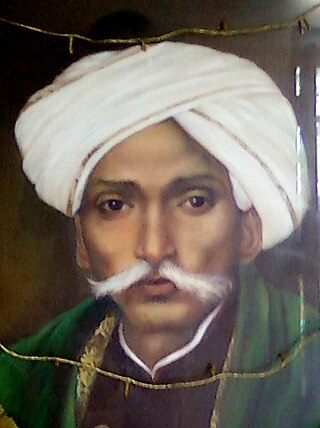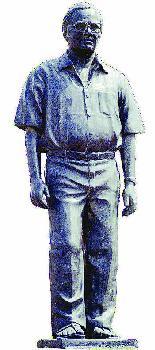Related Research Articles
The word Mahakavi or Maha Kavi is an Indian honorific which means "Great Poet" in Sanskrit. This may refer to:

Gurajada Venkata Apparao was an Indian playwright, dramatist, poet, and writer known for his works in Telugu theatre. Rao wrote the play Kanyasulkam in 1892, which is considered as the greatest play in the Telugu language. One of the pioneers of Indian theatre, Apparao holds the titles Kavisekhara and Abyudaya Kavitha Pithamahudu. In 1910, Rao scripted the widely known Telugu patriotic song "Desamunu Preminchumanna".

Telugu literature is the body of works written in the Telugu language. It consists of poems, short stories, novels, plays, and song lyrics, among others. There is some indication that Telugu literature dates at least to the middle of the first millennium, the first extant works are from the 11th century when the Mahabharata was first translated to Telugu from Sanskrit by Nannaya. The language has experienced a golden age under the patronage of the Vijayanagara Emperor-Poet Krishnadevaraya.
Dravida Brahmins, or simply Dravidulu, are Hindu brahmins and a sub-caste of the Telugu Brahmins of Andhra Pradesh in South India, who migrated from Tamil-speaking regions. They are further divided into sub-sects based on the places where they have settled such as Aaraama Dravidulu, Pudur Dravidulu, Konaseema Dravidulu, Peruru Dravidulu, Tummagunta Dravidulu and Dimili Dravidulu.They are primarily categorized as the Saiva Brahmins or followers of Shiva.

Telugu theatre is Indian theatre in the Telugu language, based in the states of Andhra Pradesh and Telangana. Gurajada Apparao wrote the play, Kanyasulkam in 1892, which is often considered the greatest play in the Telugu language. C. Pullaiah is cited as the father of Telugu theatre movement.

Jonnalagadda Venkata Somayajulu was an Indian actor known for his works in Telugu cinema and a few Tamil, Kannada, Hindi and Malayalam films. In 1981, he received the Filmfare Award for Best Actor – Telugu for his work in the classic Sankarabharanam. On the centenary of Indian cinema, Forbes included his performance in the film among the 25 Greatest Acting Performances of Indian Cinema.

Rao Venkata Kumara Mahipati Surya Rau CBE (1885–1964) was Maharajah of Pithapuram. He was called by Telugu people "Abhinava Krishnadevaraya". Maharani Sita Devi of Baroda was his daughter.
Sthanam Narasimha Rao, popularly known as Sthanam, was an Indian actor known for his works in Telugu theatre and Telugu cinema. He was known for playing female characters and was a recipient of a Padma Sri Award. His depiction of the Sringara rasa as Satyabhama in Srikrishna tulabharam kept audiences spellbound. Equally enchanting performances in Roshanara, Deva Devi in Vipranarayana and the eponymous Chintamani made his place in Telugu theater permanent. His most memorable acting, however, was as Madhuravani in Gurajada Appa Rao's comedy Kanyasulkam.
Kanyasulkamu is a 1955 Indian Telugu-language philosophical film directed by P. Pullayya and produced by D. L. Narayana for his production company Vinodha Pictures. The film stars N. T. Rama Rao, Savitri and Sowcar Janaki, with soundtrack and score by Ghantasala. This film marked the screen debut of actress, Saradha who made a cameo appearance for a three-minute song sequence as a child artist.
Vangara Venkata Subbaiah, better known as Vangara, was an actor of Telugu cinema. He acted in more than 100 films and in some plays.

Garikipati Narasimha Rao is an Indian scholar, litterateur, and avadhani from Andhra Pradesh. In 1996, he performed Avadhanam with 1116 Pruchchakas for 21 days in Kakinada. He also delivers lectures on personality development based on dharmic culture and way of life. He regularly appears on Telugu TV channels like SVBC, Bhakti TV, and ABN Andhra Jyothi giving discourses on ancient Hindu texts like Bhagavadgita, Ramayana, and Mahabharata. In 2022, he was awarded India's fourth-highest civilian award Padma Shri by the government of India.
Mudigonda Lingamurthy, shortly Lingamurthy, was an Indian film character actor known for his works in Telugu cinema and theater.

School Master is a 1958 Indian Kannada-language film produced and directed by B. R. Panthulu. The film stars Panthulu himself in the lead role along with Dikki Madhava Rao, M. V. Rajamma, Udaykumar, Sivaji Ganesan, Gemini Ganesan and B. Saroja Devi in important roles. This was the first Kannada film to complete a silver jubilee. The film had its children's dance drama in Gevacolor, taken by cinematographer W. R. Subba Rao. It was later remade in Telugu, Tamil, Malayalam and Hindi in spite of it being dubbed in Tamil and Telugu as Engal Kudumbam Perisu and Badi Pantulu respectively.

Rachakonda Viswanatha Sastri (1922–1993) was a Telugu writer who published several novels and more than 60 short stories in six volumes. Often praised for his unique style, Ravi Sastry supported marginalized communities. Professionally, he was a lawyer.
Duvvuri Venkata Ramana Shastri (1897–1972), popularly known as the Kalaprapurna Duvvuri, was a Telugu - Sanskrit scholar of the 20th century. He studied Sanskrit and worked as Telugu Lecturer for more than six decades. He wrote Ramaneeyam a book on Telugu grammar and he translated Pingarli Surana kalapurnodayam to Telugu as "Madhura Lalasa". In addition he wrote an autobiography. His autobiography was focused on many teachers and giants from Telugu literature rather than his birth and family details. He held high standards for good hand writing.
Kokkonda Venkata Ratnam Pantulu (1842–1915) was a well-known Telugu and Sanskrit writer in the nineteenth century. As a respect word pantulu meaning scholar was added. He was known as Andhra Johnson and is remembered as the multifaceted Andhra genius, the pioneer of many movements in social reform, literature, publication, journalism.
Lakshmanayyar Rama Swamy is an author, translator and short story writer from Visakhapatnam, Andhra Pradesh. His work "Sufi Cheppina Katha" got the Sahitya Academy Award for Telugu Translation of Malayalam Novel "Sufi Paranja Katha" written by KP Ramanunni for the year 2015.
Abburi Ramakrishna Rao was an Indian writer of the Telugu language, scholar, novelist, playwright, literary critic, humanist and professor of Library Science. Gurajada Apparao, Rayaprolu Subbarao, and Abburi Ramakrishna Rao were considered as the trio of modern poetry, as all their works were published in the same period.
Velcheru Narayana Rao is an Indian author, critic, and literary translator. He is a professor at the University of Wisconsin–Madison in the Department of South Asian Studies. His work is primarily focused on Telugu literature for which he received the Sahitya Akademi Fellowship, the highest honour conferred by Sahitya Akademi, in February 2021.
Kondaveeti Venkatakavi is an Indian poet, scholar, and scriptwriter from Andhra Pradesh. He served as the Principal of a Sanskrit college. He is best known for writing the dialogues in the film Daana Veera Soora Karna (1977).
References
- ↑ 20th Century Telugu Luminaries, Potti Sriramulu Telugu University, Hyderabad, 2005
- ↑ "ಗುರಜಾಡ ವೆಂಕಟ ಅಪ್ಪಾರಾವ್ – ಚಿಲುಮೆ". 17 July 2016.
- ↑ Staff Reporter (22 September 2016). "Gurajada's literary contribution recalled". The Hindu.
- ↑ Sarma, G. v Prasada (22 September 2016). "Gurajada's patriotic song set to go places". The Hindu.
- ↑ Gopal, B. Madhu (26 December 2012). "Time we perpetuated Gurajada memory" – via The Hindu.
- ↑ Apparao, Gurujada Venkata (1 January 2002). Kanyasulkam. Book Review Literacy Trust. ISBN 9788188434008 – via Google Books.
- 1 2 3 4 5 6 Rau, M. Chalapathi (1 January 1976). "Gurazada Commemorative Volume". South Delhi Andhra Association – via Google Books.
- 1 2 3 4 5 6 Suryanarayana, Peri (1 January 1968). "The life and greatness of Sri Gurajada Venkata Apparao". Vignana Sahiti Publications – via Google Books.
- ↑ Narala, Veerayya. "Kanyasulka Punahsrushti". In Modali, Nagabhushana Sharma; Etukuri, Prasad (eds.). Kanyashulkam Noorella Samalochanam (in Telugu). pp. 102–112.